The Life of the Prophet Muhammad Essay
Muhammad was protected from a life of oppression by his uncle, who offered him work in his effective cavalcade occupational. Married to a wealthy entrepreneur in her individual precise Muhammad’s axiom immediately showed how the essential kinfolks of the Quran survived (Alalwani & Islam 2021). They stayed egotistical, thoughtless, and selfish, understood solitary in resources, and acquired no accountability for persons freestanding their instantaneous, exclusive disk. Muhammad’s aphorism this deterioration in old-style beliefs is a danger to the actual survival of his society.
However, we must remember that the divisions of Muhammad’s lifetime were transcribed to fashionable content customs and comprised of astounding and mythological landings that strength remains misconstrued today. For instance, we partake eminent through the divisions immediate the Axial Statesmen, the Old Testament then Gospels, and such versions are not en route for been taken factually.
No god but then God, they “purpose as foretelling topos: a conservative literateness theme established in record traditions. These landing resembling the beginning accounts now the Gospels. These landings is not proposed to narrate past occasions but to clarify the anonymity of the farsighted involvement. They respond to the interrogations: What ensures it means to stay a prophet? … The aforementioned is not essential whether the divisions recounting the infantile of Muhammad or Jesus remain factual (BinTaleb & Aseery 2022). What is imperative is these sections approximately around our sovereigns: that theirs stands a righteous and everlasting inclination, recognized by God since the instant of formation”.
Muhammad stayed innate in Mecca, the time acknowledged as the Time of the Monster, in which Mecca remained unbelievably protected. Harun says that Abraham, the Abyssinian Christian monarch, criticized Mecca through a flock of elephant’s trade-in from Africa. Abraham’s goalmouth remained to terminate the Ka’ba and brand the Christian religious’ the new-fangled spiritual center of the Arab sphere (Harun et al., 2021). The horrified Quraysh had not ever understood an elephant, copious less than an entire crowd; therefore, they sprinted to the mounts to seepage, leaving the Ka’ba via no defense. Then impartial by confronted, the sky departed shadowy as a herd of fowls, all resounding a rock in its mouth, showered miserable on the conquering military, which existed enforced to withdrawal.
Numerous stories border his infantile and birth, which stayed proclaimed in an account comparable to the Christian division of Mary: Muhammad’s mommy, a widow, called Amina, one time received a voice saying to her (Harun et al., 2021).“You convey now your womb the peer of the realm of this individuals, and once he is instinctive, say: ‘I home him underneath the safeguard of the One, since the wicked of each jealous person,’ then and their designation him Muhammad.”
Now Muhammad, the Ecosphere Changer, Muhammad Jebara, the historian then researcher of Semitic tongues, delivers a changed story of Muhammad’s lifespan and initial ages discarded from widespread exploration into creative foundations. Retain in cognizance that, in mutual with different Semitic dialects, Arabic arguments are frequently fabricated starting three or four communication origins, every source providing the essential connotation. Tabroni et al., (2022) discoveries designate that Muhammad’s title remained specified to him through his grandpa. That predestined ‘the archetypal one’ “so that his specimen might have triumphed in the uppermost spaces and his title would originate towards been recognized amongst the states.”
Additionally, the source H-M-D “defines somebody perpendicular on a prominent podium who validates movements to remain rivaled by observers” records (Tabroni et al., 2022). The preface M that twitches the label (Tabroni et al., 2022) “malformed the source achievement designated from approximately predetermined to approximately ageless…Muhammad pronounces a continuous public of liability, unendingly inspirational others to inspire his occurrence.”
Before the exposure, he consumed no knowledge that his intention would remain to gadget these crucial variations. He began as a negligible fraternity. Hashim and academics point to the view that in communal through other clairvoyants earlier than him. He primarily required nonentity to fix through what was fashionable and remained exceptionally distressed (Alalwani & Islam 2021). “Mohammad’s power devises disappeared through his proposal towards ending it all, and then antiquity would have curved out fairly differently.”
Alalwani, R. T., & Islam, A. (2021). New paradigm in addressing islamophobia: An analytical study based on the life of the Prophet Muhammad (PBUH). Intellectual Discourse, 29 (1), 71-88. Web.
BinTaleb, A., & Aseery, A. (2022). What can the Prophet Muhammad teach us about pandemics? Journal of Religious & Theological Information, 21 (1-2), 82-94. Web.
Harun, D. R., Rasyid, A. D., Lubis, A., Mohd, M. A. W. F. B., & Rasyid, B. D. (2021). The writing of Hadith in the era of Prophet Muhammad: A critique on Harun Nasution’s thought. Al-Jami’ah: Journal of Islamic Studies, 59 (1), 191-220.
Tabroni, I., Putra, D. D., & Adawiah, N. (2022). Forming character with morals Prophet Muhammad saw. East Asian Journal of Multidisciplinary Research, 1 (1), 41-48. Web.
- Buddha Representations in South and Southeast Asia
- Amos the Prophet: Life, Views, Writing and Speech Styles
- Copious Party Supply Retailer's Marketing Strategy
- Dealing With the Death of a Grandfather
- A visit to Grandpas Dylan Thomas
- Paul’s Life and Significance for the Church Today
- Evangelical Billy Graham's Life and Ministry
- Analysis of Saint Anthony of Padua
- Martin Luther. Roman Catholicism
- Report on Dr. King’s Letters
- Chicago (A-D)
- Chicago (N-B)
IvyPanda. (2023, April 5). The Life of the Prophet Muhammad. https://ivypanda.com/essays/the-life-of-the-prophet-muhammad/
"The Life of the Prophet Muhammad." IvyPanda , 5 Apr. 2023, ivypanda.com/essays/the-life-of-the-prophet-muhammad/.
IvyPanda . (2023) 'The Life of the Prophet Muhammad'. 5 April.
IvyPanda . 2023. "The Life of the Prophet Muhammad." April 5, 2023. https://ivypanda.com/essays/the-life-of-the-prophet-muhammad/.
1. IvyPanda . "The Life of the Prophet Muhammad." April 5, 2023. https://ivypanda.com/essays/the-life-of-the-prophet-muhammad/.
Bibliography
IvyPanda . "The Life of the Prophet Muhammad." April 5, 2023. https://ivypanda.com/essays/the-life-of-the-prophet-muhammad/.
- To find inspiration for your paper and overcome writer’s block
- As a source of information (ensure proper referencing)
- As a template for you assignment
Muhammad was a prophet and founder of Islam.
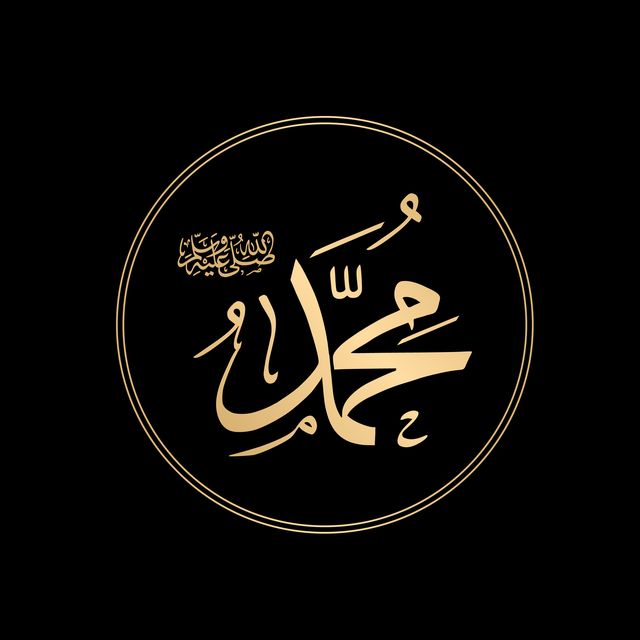
We may earn commission from links on this page, but we only recommend products we back.

Who Was Muhammad?
Quick facts, the life of muhammad, the prophet muhammad, the death of muhammad.
Muhammad was the prophet and founder of Islam. Most of his early life was spent as a merchant. At age 40, he began to have revelations from Allah that became the basis for the Koran and the foundation of Islam. By 630 he had unified most of Arabia under a single religion. As of 2015, there are over 1.8 billion Muslims in the world who profess, “There is no God but Allah, and Muhammad is his prophet.”
FULL NAME: Muhammad ibn Abdullah ibn Abd al-Muttalib ibn Hashim BORN: c. 570 BIRTHPLACE: Makkah, Saudi Arabia DEATH: June 8, 623
Muhammad was born around 570, AD in Mecca (now in Saudi Arabia). His father died before he was born and he was raised first by his grandfather and then his uncle. He belonged to a poor but respectable family of the Quraysh tribe. The family was active in Meccan politics and trade.
Many of the tribes living in the Arabian Peninsula at the time were nomadic, trading goods as they crisscrossed the desert. Most tribes were polytheistic, worshipping their own set of gods. The town of Mecca was an important trading and religious center, home to many temples and worship sites where the devoted prayed to the idols of these gods. The most famous site was the Kaaba (meaning cube in Arabic). It is believed to have been built by Abraham (Ibrahim to Muslims) and his son Ismail. Gradually the people of Mecca turned to polytheism and idolatry. Of all the gods worshipped, it is believed that Allah was considered the greatest and the only one without an idol.
In his early teens, Muhammad worked in a camel caravan, following in the footsteps of many people his age, born of meager wealth. Working for his uncle, he gained experience in commercial trade traveling to Syria and eventually from the Mediterranean Sea to the Indian Ocean. In time, Muhammad earned a reputation as honest and sincere, acquiring the nickname “al-Amin” meaning faithful or trustworthy.
In his early 20s, Muhammad began working for a wealthy merchant woman named Khadijah, 15 years his senior. She soon became attracted to this young, accomplished man and proposed marriage. He accepted and over the years the happy union brought several children. Not all lived to adulthood, but one, Fatima, would marry Muhammad’s cousin, Ali ibn Abi Talib, whom Shi’ite Muslims regard as Muhammad’s successor.
Muhammad was also very religious, occasionally taking journeys of devotion to sacred sites near Mecca. On one of his pilgrimages in 610, he was meditating in a cave on Mount Jabal aI-Nour. The Angel Gabriel appeared and relayed the word of God: “Recite in the name of your Lord who creates, creates man from a clot! Recite for your lord is most generous….” These words became the opening verses of sūrah (chapter) 96 of the Qur'an. Most Islamic historians believe Muhammad was initially disturbed by the revelations and that he didn’t reveal them publicly for several years. However, Shi’a tradition states he welcomed the message from the Angel Gabriel and was deeply inspired to share his experience with other potential believers.
Islamic tradition holds that the first persons to believe were his wife, Khadija and his close friend Abu Bakr (regarded as the successor to Muhammad by Sunni Muslims). Soon, Muhammad began to gather a small following, initially encountering no opposition. Most people in Mecca either ignored him or mocked him as just another prophet. However, when his message condemned idol worship and polytheism, many of Mecca’s tribal leaders began to see Muhammad and his message as a threat. Besides going against long standing beliefs, the condemnation of idol worship had economic consequences for merchants who catered to the thousands of pilgrims who came to Mecca every year. This was especially true for members of Muhammad’s own tribe, the Quraysh, who were the guardians of the Kaaba. Sensing a threat, Mecca’s merchants and leaders offered Muhammad incentives to abandon his preaching, but he refused.
Increasingly, the resistance to Muhammed and his followers grew and they were eventually forced to emigrate from Mecca to Medina, a city 260 miles to the north in 622. This event marks the beginning of the Muslim calendar. There Muhammad was instrumental in bringing an end to a civil war raging amongst several of the city’s tribes. Muhammad settled in Medina, building his Muslim community and gradually gathering acceptance and more followers.
Between 624 and 628, the Muslims were involved in a series of battles for their survival. In the final major confrontation, The Battle of the Trench and Siege of Medina, Muhammad and his followers prevailed and a treaty was signed. The treaty was broken by the Meccan allies a year later. By now, Muhammad had plenty of forces and the balance of power had shifted away from the Meccan leaders to him. In 630, the Muslim army marched into Mecca, taking the city with minimum casualties. Muhammad gave amnesty to many of the Meccan leaders who had opposed him and pardoned many others. Most of the Meccan population converted to Islam. Muhammad and his followers then proceeded to destroy all of the statues of pagan gods in and around the Kaaba.
After the conflict with Mecca was finally settled, Muhammad took his first true Islamic pilgrimage to that city and in March, 632, he delivered his last sermon at Mount Arafat. Upon his return to Medina to his wife’s home, he fell ill for several days. He died on June 8, 632, at the age of 62, and was buried at al-Masjid an-Nabawi (the Mosque of the Prophet) one of the first mosques built by Muhammad in Medina.
Fact Check: We strive for accuracy and fairness. If you see something that doesn't look right, contact us !
The Biography.com staff is a team of people-obsessed and news-hungry editors with decades of collective experience. We have worked as daily newspaper reporters, major national magazine editors, and as editors-in-chief of regional media publications. Among our ranks are book authors and award-winning journalists. Our staff also works with freelance writers, researchers, and other contributors to produce the smart, compelling profiles and articles you see on our site. To meet the team, visit our About Us page: https://www.biography.com/about/a43602329/about-us


Famous Religious Figures
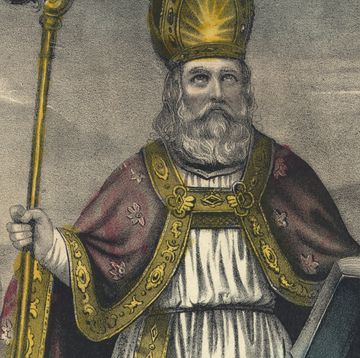
7 Little-Known Facts About Saint Patrick
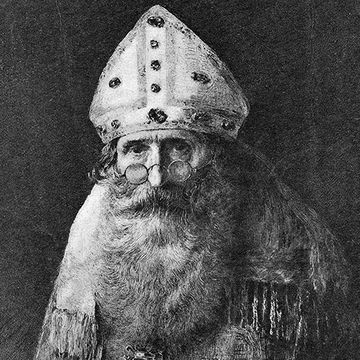
Saint Nicholas

Jerry Falwell
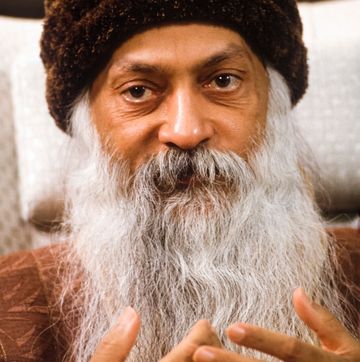
Bhagwan Shree Rajneesh
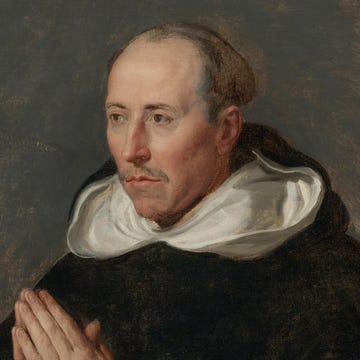
Saint Thomas Aquinas
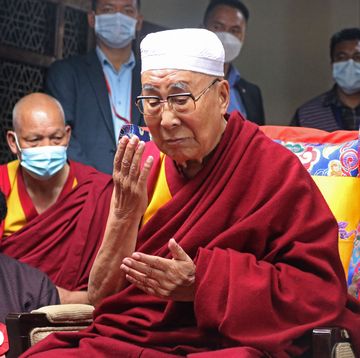
History of the Dalai Lama's Biggest Controversies
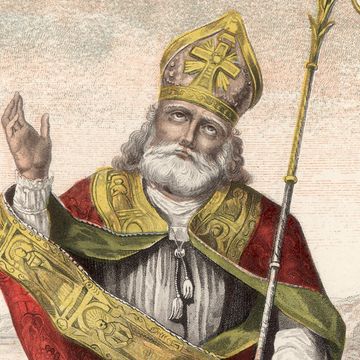
Saint Patrick
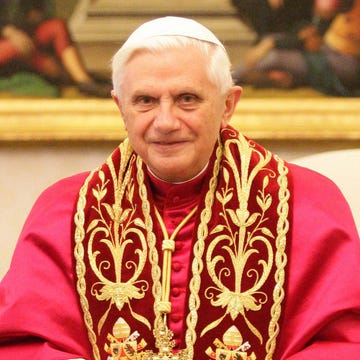
Pope Benedict XVI
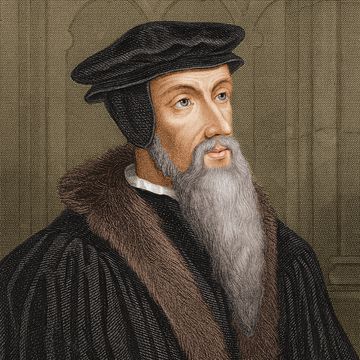
John Calvin
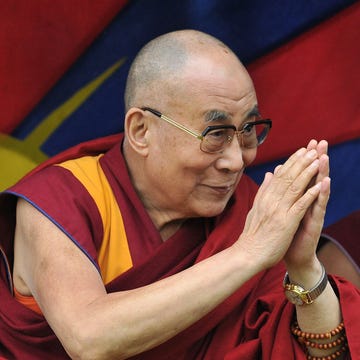
Pontius Pilate
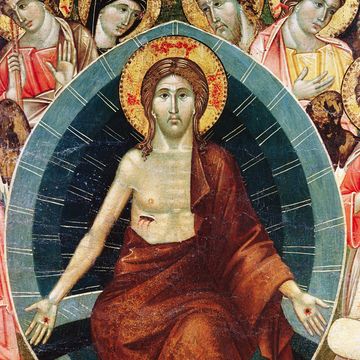
Jesus Christ

IMAGES